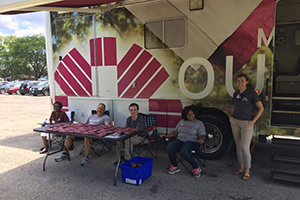By PATRICIA CORRIGAN

For two years running, Reynalda Davis, second from right, has gained on-the-job skills as an intern in the Institute for Diversity and Health Equality’s Summer Enrichment. Davis is completing a master’s degree in health administration at the University of Kentucky
Health care leaders agree that patients and providers benefit when their organizations reflect the cultural and ethnic diversity of their markets. To help fill the pipeline of minority candidates for health administration jobs, several Catholic health care systems have welcomed minority graduate students as interns through the Institute for Diversity and Health Equity's summer and fall enrichment programs.

Hall

Kinsella
St. Louis-based SSM Health and Columbus and Trinity Health's Ohio-based Mount Carmel Health System each hosted an intern this summer, offering experiential learning opportunities and the chance to watch decision leaders in action.
"At SSM Health, we have a big desire to help foster people coming into the industry and this has been a good opportunity," said Matt Kinsella, SSM's regional vice president of finance in Southern Illinois. "The classroom is a great setting to learn management principles, but through the Summer Enrichment Program, graduate students have a chance to observe governance, leadership and operations, and build on those driving principles."
Shantrell Hall did all that and more during her eight-week paid internship at SSM Health St. Mary's Hospital in Centralia, Ill., and SSM Health Good Samaritan Hospital in Mt. Vernon, Ill. Hall is completing master's degrees in health administration and public health at Missouri State University.
"I could sit in a classroom all day, but I can learn better with hands-on experience," said Hall, 26, one of 43 Summer Enrichment Program (SEP) interns in 2018 — selected from 150 applicants.
Hall met frequently with hospital, regional and community leaders. She helped expand a community weight loss program and prepare a business plan for a community health bus.
Reflecting on SSM Health's experience with SEP, Kinsella said, "Shantrell was the first SEP intern in our Southern Illinois region, and we've already had conversations with her about what worked well and what we can do better next time. This has been a good experience, and we will do it again."
Filling the pipeline
Founded in 1994 and based in Chicago, the Institute for Diversity and Health Equity works with health services organizations around the country to expand leadership opportunities for ethnic minorities in health management. It is an affiliate of the American Hospital Association. In 2015, an institute survey signaled a continuing need to develop diverse candidates for leadership roles in health care. Minorities constitute just 14 percent of hospital board members, 11 percent of executive leadership positions and 19 percent of first- and mid-level management positions, the survey found.
To date, more than 1,500 minority graduate students in health administration or related fields have interned at hospitals, health systems and other health care organizations. Jasmin Clark, the institute's membership and education specialist, said many program alumni now hold senior management and board positions in health care organizations.
CHA became a partner in the Institute for Diversity shortly after the institute was formed and has a presence on its board of directors, said Kathy Curran, CHA's senior director of public policy. "The SEP internships provide practical experience and help minority graduate students make connections and find a mentor," she said.
Call to mission
Fran Feehan is one of those mentors. Feehan, the vice president of oncology for Mount Carmel Health System, served as a preceptor this summer for Elena Smith, a SEP intern. "The value for us is developing a diverse mix of future leaders, and this internship program provides a pipeline for us," Feehan said. Mount Carmel is part of Trinity Health.
Smith, 22, is the second SEP intern at Mount Carmel in as many years, and she had a busy summer. "I've been attending meetings at the corporate office, visiting the four hospitals, looking at data from various departments and taking part in conference calls about the new hospital," Smith said. She is working toward an M.B.A. in health care administration at Indiana Wesleyan University.
Originally, Smith wanted to be a nurse, but she developed an interest in the business side of health care. Her resume includes time spent working at a for-profit hospital before the internship at Mount Carmel.
"Being at Mount Camel has opened my eyes," she said. "This health care system is mission driven, and people here believe in that mission. That's comforting for me."
Reynalda Davis, a SEP intern at Mount Carmel in 2017, agreed. "Everyone at every level, of whatever faith, had such passion and integrity," said Davis, 33. "Mount Carmel cares about everyone that steps in their doors, and that made me want to be part of a mission-driven system in the future."
This summer Davis interned at St. Louis Children's Hospital. She is in her last semester at the University of Kentucky, where she will earn a master's degree in health care administration. Part of Davis' internship at Mount Carmel was spent on community health projects for pregnant women, new mothers and the homeless. "I also did some data analytics to help determine who was using Mount Carmel's services and what additional services were needed," she said.
Victor Rivas' 2017 SEP internship at SCL Health, based in Broomfield, Colo., included helping to prepare a report on community health and an assessment of community health needs. "It was a wonderful experience," said Rivas, 25. "I got to interact with executives who oversee SCL Health operations for the greater Denver area."
Rivas has a master's degree in public health with a concentration in health care management and policy from Texas A&M University. He recalled that a difficult personal experience a few years ago sparked his interest in health care management.
"It got me thinking there has to be a better way to help people who need access to health care, and that led me to my degree path," he said. Headed for a job interview in Austin, Texas, last month, he added, "My ultimate goal is to work in the nonprofit health care world. Doing the work of God in a place where we help people is important to me."
The thick of things
Christian Vazquez, 27, is a doctoral student at the Steve Hicks School of Social Work at The University of Texas at Austin. He has a master's degree in social work. In 2017, he was a SEP intern at Ascension Wisconsin. "My boss oversaw all Ascension Wisconsin hospitals, but I was based out of Milwaukee and spent most of my time at Columbia St. Mary's Hospital," he said.
Vazquez's main focus was how to make the discharge process better for patients. He also was involved in qualitative and quantitative analysis, diversity, equity and inclusion, and how to retain staff and physicians. "This was all great for me, getting insight from the people doing the work and helping form ideas for possible changes," he said.
At this point in his studies, Vazquez's future may be in academia as a researcher. "I haven't closed the door on health care administration," he said. "When I finish my doctorate, I will apply for work in a range of areas, and I feel lucky to have experience in both areas."
|
Information for potential host sites
The Institute for Diversity and Health Equity's Summer Enrichment Program (SEP) is a 10-week paid internship for minority graduate students pursuing advanced degrees in health care administration or a related field. Experienced administrators at the host site serve as preceptors and mentors.
The host site pays an administrative fee of $1,200 per SEP intern and the institute recommends that host sites pay interns at least $15 per hour/$600 a week. Registration for the 2019 SEP will open at the end of October.
The institute also sponsors a 20-week Fall Enrichment Program for minority individuals who have graduated in the last two years from accredited graduate programs. Qualified applicants hold M.B.A., M.P.H. or M.H.A. degrees and earned a 3.0 or higher grade point average.
The host site pays an administrative fee of $2,500 per intern and the institute recommends that host sites pay interns at least $20 per hour/$800 a week. Health care organizations can register to participate in the 2018 Fall Enrichment Program until Oct. 1.
For more information or to enroll as a host site, click on the "Education" bar at diversityconnection.org or contact Jasmin Clark at [email protected] or (312) 422-2658.
|
Copyright © 2018 by the Catholic Health Association
of the United States
For reprint permission, contact Betty Crosby or call (314) 253-3490.